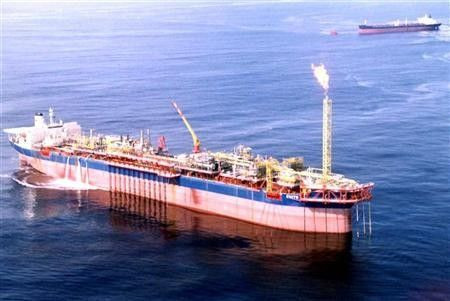Nigerian oil output at 2.4 mbpd, within quota-NNPC

Nigeria's combined crude oil and condensate production is currently 2.4 million barrels per day (bpd) but output from Africa's largest crude exporter still remains within its OPEC quota, the state oil company says.
Nigerian National Petroleum Corporation (NNPC) also said on Thursday that plants supplying power to Africa's most populous nation were receiving more gas than they could generate.
Chronic power shortages are holding back sub-Saharan Africa's second largest economy and electricity supply is a key issue for many Nigerians who are deprived of light at night or even the ability to power basic water pumps.
Nigeria will hold nationwide elections in April and the government and state-oil company will be keen to re-assure the public that they are improving the power problem.
Gas supply to power is presently more than the power plants can carry and this has contributed immensely in bolstering electricity stability in Nigeria, an NNPC statement said.
Even with Nigeria's power stations running at full capacity the electricity supply would barely touch the surface of the needs of more than 140 million people.
NNPC said oil supplies had also improved but denied Nigeria was producing more crude oil than the quota agreed within OPEC, the producer group which sets output targets for its members to regulate global supplies and oil prices.
Nigeria currently produces an average of 2.4 million barrels a day including condensate ... the country presently meets its OPEC quota, an NNPC statement said.
CONDENSATE
Condensate, a light oil equivalent is not included in OPEC targets, but analysts and crude export shipping data suggest Nigeria is still far exceeding its target production.
OPEC agreed on output curbs in 2008 to support oil prices, which dropped from a high of nearly $150 a barrel to below $33 within six months. But with Brent crude close to $100 a barrel, members are under less pressure meet their targets.
Nigeria's oil and gas output has been hampered for years by militant attacks on oil facilities in the Niger Delta, where pipelines and platforms lay vulnerable to strikes.
But a presidential amnesty in 2009 saw thousands of militants lay down their weapons prompting more than a year without a major attack, allowing oil companies to repair damaged infrastructure and ramp up oil output.
Militant groups have always claimed the attacks on oil facilities are part of a fight for a fairer share of the wealth generated in their back yard.
But the line between militancy and crime is blurred as gang leaders have grown rich on the spoils of kidnapping for ransom and the theft of industrial quantities of oil.
The tensions between foreign oil companies and the people of the Niger Delta stem back decades.
In the Ogoni region, huge quantities of oil lay untouched under the ground, after Royal Dutch Shell withdrew from the area in 1993 following a high profile campaign against the oil major by local residents.
NNPC said its subsidiary Nigeria Petroleum Development Company (NPDC) will be returning to the Ogoni oilfield to restart production which will boost the country's output.
Very shortly the NPDC will re-enter the Ogoni oilfield to commence oil exploration and production in line with its mandate of 250,000 barrels of crude oil per day in 2015.
© Copyright Thomson Reuters 2024. All rights reserved.





















